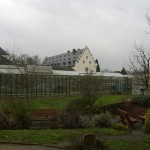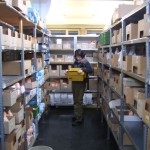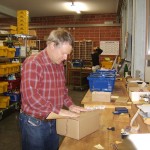We left Greifswald for Bingenheimer Saatgut AG, the largest biodynamic seed company in Germany, Leaving super extra early on Tuesday morning, we traveled via “Mitfahrgelegenheit” through Berlin and on down to a small town northeast of Frankfurt. “Mitfahrgelegenheit” is the musical word for ‘organized rideshare’, and there are several websites that one can use to post rides wanted or rides offered. People in the US use Craigslist for this purpose, but in Germany the practice is more widespread and therefore more effective. Mitfahrgelegenheit costs about half as much as a train and can get you there twice as fast, and it is a good way to meet people. Since we traveled so far, we pieced together two rides and had a few hours to hang out in Berlin. We were delivered to the door of Bingenheimer, 13 hours after the start of our journey – not really twice as fast as the train but still half the cost!
We stayed, worked and learned with the kind folks at Bingenheimer for three work days, from Wednesday through Friday. This was our first visit with a seed company, and we learned a lot and had a really good time. Andrew was in heaven being surrounded by so many seeds, and the sense of community there really impressed me. But these are just two of the indicators that Bingenheimer Saatgut AG is not your average seed company. It is primarily Biodynamic. It is the hub for a network of 30 Biodynamic vegetable breeders in Germany. It was once part of and is still affiliated with the Lebensgemeinschaft Bingenheimer, a Camphill-esque community that fully integrates people with developmental disabilities into the tasks of daily life. As such, the Saatgut Werkstatt (seed workshop) is one of five workshops that employ disabled people in the community; they also rotate through candle making, woodworking, ceramics, and weaving workshops. Additionally, some of them work on the biodynamic dairy farm and others in the gardens, helping to grow food for the community and seed for the seed company.
Bingenheimer is the largest biodynamic seed company in Germany, and therefore most likely the largest in the world. They employ roughly 20 people, have extensive seed cleaning machines and vast storage facilities. They run their own laboratory that tests for germination, vigor, and disease. They have treatment facilities for seeds that are detected to carry seed borne diseases. They grow 10 -20% of the seed in the catalog and network with over 100 seed growers in Germany and surrounding countries.
During our three days there we ate with the community, sorted beans on a conveyor belt, pulled orders for shipping, and walked around the winter gardens. We took a short tour of the dairy (including cheese room!), and had our second mind-blowing experience with a biodynamic plant breeder, Ute Kirchgaesser. More details on Ute and her projects to follow…



Leave a Reply